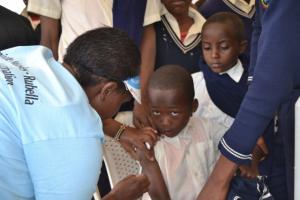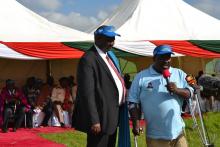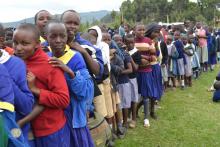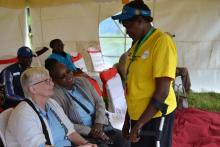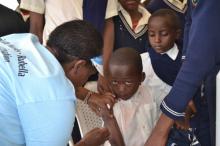Kenya Rolls out massive Measles-Rubella and Tetanus campaign
October 2016 - Kenya has rolled out a massive nation-wide Measles-Rubella campaign which targets almost half the population.
The campaign which runs from May 16-24 will cover all the 47 counties and target 19,922,722 children between 9 months and 14 years. The rubella component will be offered in public health facilities for the first time but will be offered as one vaccine with measles. In addition, 11 targeted counties will offer tetanus vaccination for girls and women aged 15-49. These are counties more at risk and with low immunization coverage. The targeted numbers are more than 800,000.
The children, girls and women will be reached through the 20,000 vaccination centres identified in health facilities, temporary/fixed posts and in schools. They will be attended by 42,000 health workers and 24,000 volunteers all spread around the country. The exercise – due to its large targeted numbers and nationwide logistical arrangement - is deemed the largest campaign since independence.
Explaining the rationale for the introduction of the rubella component, officials at the Ministry of Health said the incidence of rubella and outbreaks have been on the increase in recent years. This led to the government decision to introduce the rubella component into the existing measles antigen. The Measles-Rubella vaccine will be introduced in the routine immunization next year.
Coverage of measles is also not up to optimum. Between 2013 and 2015, 1,468,268 children aged below 1 year were not effectively reached with measles vaccine. Further, only 85% of children vaccinated against measles develop immunity from the first dose, hence the need for the introduction of Measles Second Dose at 18months.
Dr Ephantus Maree, head of the national vaccines department said 95% population immunity was not achievable with only one routine dose even at very high vaccination coverage.
“There is risk of widespread measles outbreak even amongst older children if nothing is done to ensure these children get another chance to get vaccinated,” he said
“Measles and rubella are highly infectious, cause rashes, eye infection, respiratory infections, diarrhea and death in some cases. Rubella is a leading cause of congenital defects,” they said.
Kenya has been offering measles one at nine months and from July 2013 an additional second dose at 18 months.
At the national launch in Narok County today, Principal Secretary Dr Nicholas Muraguri re-emphasized the significance of both measles rubella and Tetanus. He called on families to take it seriously and to save the life of children and mothers through immunization.
“Through vaccination, you spare children of all kinds of diseases associated with the measles and rubella virus, which include eye infection, respiratory infections hearing problems, heart disease, rashes, diarrhea and death in some cases.”
He warned that measles and rubella were highly infectious, while neonatal tetanus was the source of pain and death for infected children. He urged communities to avoid using unhealthy methods of dealing with the new born- umbilical wound and use the medically recommended ways to save children from tetanus infection. Kenya has yet to achieve the Maternal Neonatal Tetanus Elimination targets.
He said the government was determined to improve mother and child conditions stating that the number of children who die young had reduced due to immunization and improved health services.
The Narok governor Mr Samuel Tunai urged the the Maasai community to embrace both the tetanus and measles-rubella vaccination adding that they should not be misled by the rumours and misinformation that vaccinations are unsafe.
A Women’s representative Honourable Soipan Tuya offered to demonstrate to other women and mothers that TT was safe by having the vaccination administered to her at the launch. “I am young and want to give birth to more healthy children,” she said. “This is what I wish for all families.”
Other speakers included acting director of Medical Services Dr Jackson Kioko, who called for the strengthening of routine immunization while Dr Pirkko Heinonen, UNICEF acting director and representative for the UN family, urged families to ensure all children were immunized.
The function was also attended by the WHO Kenya County Representative Dr Custodia Mandlate who appreciated the many children and caregivers who turned up for the vaccination. She praised Hon Tuya for her willingness to be vaccinated publicly as a demonstration that tetanus was safe. “Kenya still remains behind in the region in its status to eliminate tetanus and we need such examples to show the vaccine is safe and for everyone.”
Goodwill ambassador Harold Kipchumba said immunization was no longer a choice but a right. “We cannot entertain the pain of disability any more so parents let us get all children vaccinated.”




